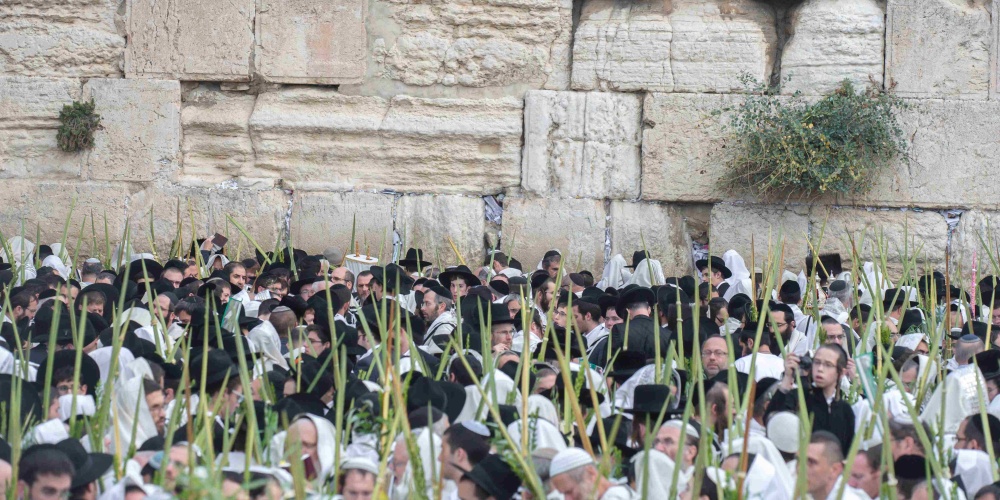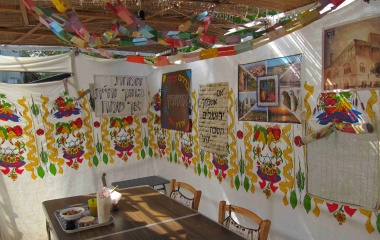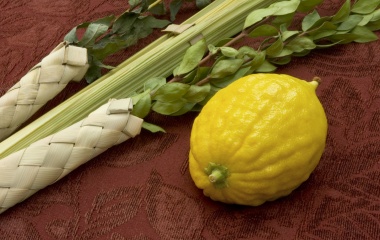
One of the unique laws of the arba minim, the four species, is that one can only fulfil the Biblical mitzvah with a set that one personally owns (Sukkah 41b). Our Sages understand that the phrase “ulekachtem lachem, and you shall take for yourself” (Vayikra 23:40) is meant most literally and that the lulav[1] must be one’s own. Borrowing a lulav for the few seconds it takes to fulfil the mitzvah might be a nice gesture of friendship, but unfortunately does not enable one to fulfil one’s obligation.
Why the verse was understood this way is never explained, and this aspect of lulav is in marked contrast to pretty much all other mitzvot. One may borrow a siddur, tallit, tefillin, shofar, or megillah to fulfil those mitzvot. It is especially praiseworthy to invite the poor to one’s home and give them matzah to fulfil their religious obligation. Why is lulav any different?
The primary purpose of the lulav is to express our thanks for the harvest, for the fact that we have food to eat. It is a tangible way to express hakarat hatov, thanksgiving for our many blessings. And the giving of thanks must be done personally—in this case, with our own lulav and etrog. It means little to say thank you with someone else’s “money”; we must do so with our own. In reality, the purchase of one’s own lulav is easy. Having proper hakarat hatov is not.
The lack of hakarat hatov is pretty much the first sin of man. When confronted by G-d as to why he ate from the forbidden fruit, Adam blamed not only his wife, but G-d Himself for having created Chava in the first place. “The woman You gave me, she gave me from the tree and I ate” (Breisheet 3:12). Rashi comments, “Kan kafar batova; here, man showed his ingratitude”. Chava was created to be a helpmate for man, and yet Adam, instead of displaying appreciation for having a life partner, basically said, G-d, You can keep her.
That the etrog is a corrective to man’s sin in Gan Eden is the basis of the view that the forbidden fruit was none other than an etrog[2] (Breisheet Rabba 15:7).
It is because gratitude must be personal that we cannot invoke the principle of shomea k’oneh, that one can fulfil mitzvot through listening to others, in all mitzvot. It is via this principle that most of us fulfil the mitzvot of kiddush, havdallah, and kriat hamegilah. We listen to others, and that is considered as if we ourselves have recited these texts.
Yet the Jerusalem Talmud notes that regarding the mitzvot of kriat shema, birchat hamazon, and tefillah, we must say the words ourselves, not relying on others to do so in our stead[3]. Accepting the yoke of heaven, expressing thanksgiving for our food and asking G-d for our needs are not things we can ask others to do on our behalf. It is why, during the repetition of the amidah, one answers amen to all brachot. But for the bracha of modim, of thanksgiving, each person must recite modim derabanan, one’s own words of thanksgiving. Saying thank you cannot be done by proxy[4].
Interestingly, Rabbi Eliezer is of the view that one can fulfil the mitzvah of sukkah only with one’s own sukkah (Sukkah 27b). One may not eat in someone else’s sukkah and hence, one may not invite friends over to join in a meal for Sukkot. Apparently, Rabbi Eliezer is of the view that the sukkah is first and foremost an expression of gratitude that we have a roof over our heads. And human nature being what it is, only when one does not have a roof over one’s head does one truly appreciate having that roof. If sitting in a sukkah is a means of offering thanksgiving, then every family must build its own sukkah. Eating in a community sukkah or even in a friend’s sukkah is not the way to personally say thank you.
There is little doubt that Rabbi Eliezer is correct that dwelling in a sukkah is meant to help us appreciate our home. As the Rashbam notes (Vayikra 23:43), it is specifically at the time of our harvest that one is most likely to say “my might and the strength of my hand brought me this success” (Devarim 8:17). This is the exact opposite of hakarat hatov and hence, it is at this time that we must leave our home and dwell in the sukkah.
Nevertheless, the view of Rabbi Eliezer has not been accepted. Doing so would impact on the ability of the Jewish people to join together, and this is a—perhaps the—major function of Yom Tov. Our Sages teach that the verse, “Kol haezrach, all citizens of Israel, shall sit in a sukkah” (Vayikra 23:42) teaches that all Jews can join together to fulfil the mitzvah in one sukkah. The unity of the people is paramount. It is not coincidental that rabbinic teachings are replete with the notion that the arba minim reflect the disparate parts of the Jewish nation, who join together to form a complete whole.
We have often noted the tremendous precision that went into the editing of the Talmud. It should come as no surprise that the same chapter that discusses the arba minim contains within it the laws of hallel, the song of thanksgiving[5]. These two mitzvot are further linked by the fact that we take and shake the lulav during hallel, indicating that lulav and hallel are two complimentary songs of thanksgiving[6]. May we merit to sing loudly.
[1] The term “lulav” is used as shorthand to also include the etrog, hadas and arava.
[2] Whether it was in fact or was not an etrog is both unknowable and irrelevant. Midrash is interested not in historical truth, but in moral truths.
[3] In practice, many (most?) Jews during the Talmudic period—and today is no different—did not know how to pray, and there was little choice but to have people fulfil their prayer obligation through the answering of amen to the prayers of others.
[4] And one can cogently argue that an email, text message, or What’sApp may be deemed a modern-day messenger. It behooves one to express gratitude by picking up the phone, or engage in the lost art of hand writing a personal note.
[5] Interestingly, the Rambam discusses the laws of hallel as part of the laws of Chanukah, a holiday declared by our Sages to have been established lehodot ulehallel (Shabbat 21b), to give thanks and sing the songs of hallel. Our Talmudic editors could not do so even had they wished to, as Rebbe did not include a discussion of Chanukah in the Mishna.
[6] Similarly, Rav Soloveitchik noted that the shofar is fundamentally an instrument of prayer to explain why we blow it during the amidah. With the mitzvah to listen to the shofar, one need not make an attempt to blow the shofar oneself.



